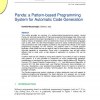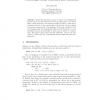57 search results - page 9 / 12 » Lazy XSL transformations |
110
Voted
SEFM
2006
IEEE
15 years 7 months ago
2006
IEEE
An optimization can be specified as sequential compositions of predefined transformation primitives. For each primitive, we can define soundness conditions which guarantee that th...
154
click to vote
ACMMSP
2006
ACM
15 years 7 months ago
2006
ACM
Many people have proposed adding transactions, or atomic blocks, to type-safe high-level programming languages. However, researchers have not considered the semantics of transacti...
129
click to vote
JOT
2008
15 years 1 months ago
2008
This article provides an overview of a pattern-based programming system, named Panda, for automatic generation of high-level programming language code. Many code generation system...
112
click to vote
APLAS
2009
ACM
15 years 8 months ago
2009
ACM
Restricting destructive update to values of a distinguished reference type prevents functions from being polymorphic in the mutability of their arguments. This restriction makes it...
121
Voted
PLILP
1992
Springer
15 years 5 months ago
1992
Springer
Attribute grammars may be seen as a (rather specialised) lazy or demand-driven programming language. The "programs" in this language take text or parse trees as input an...


